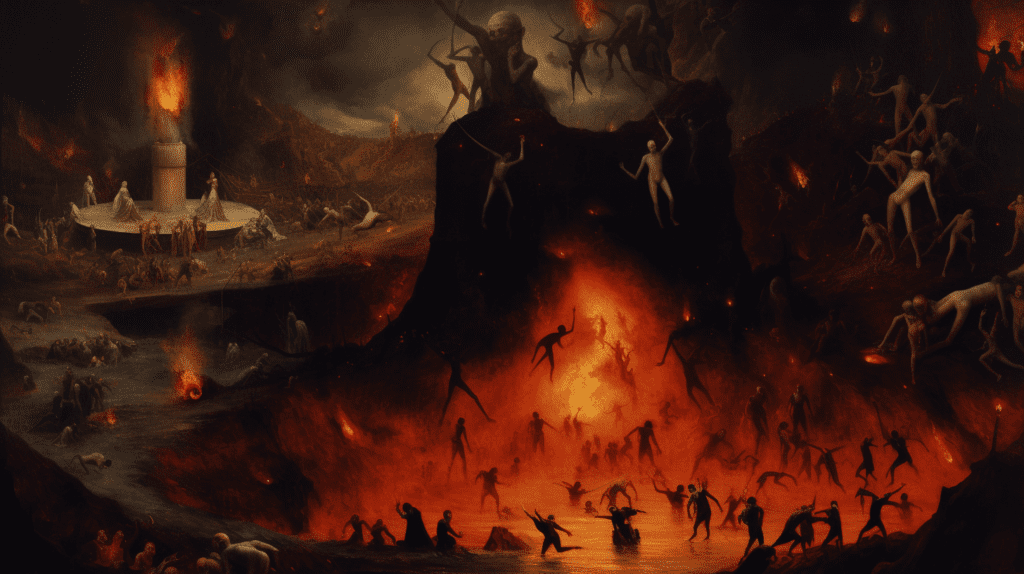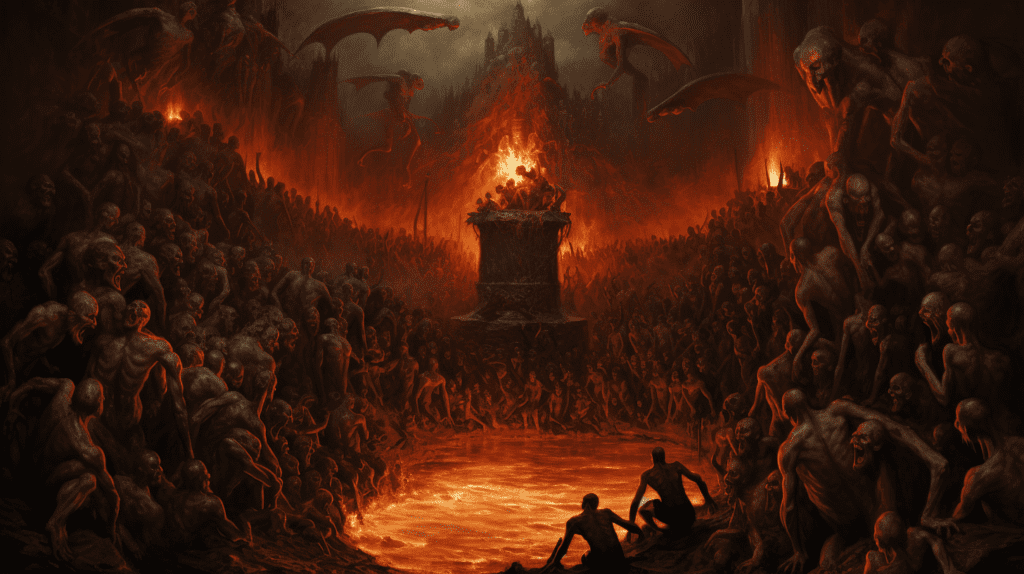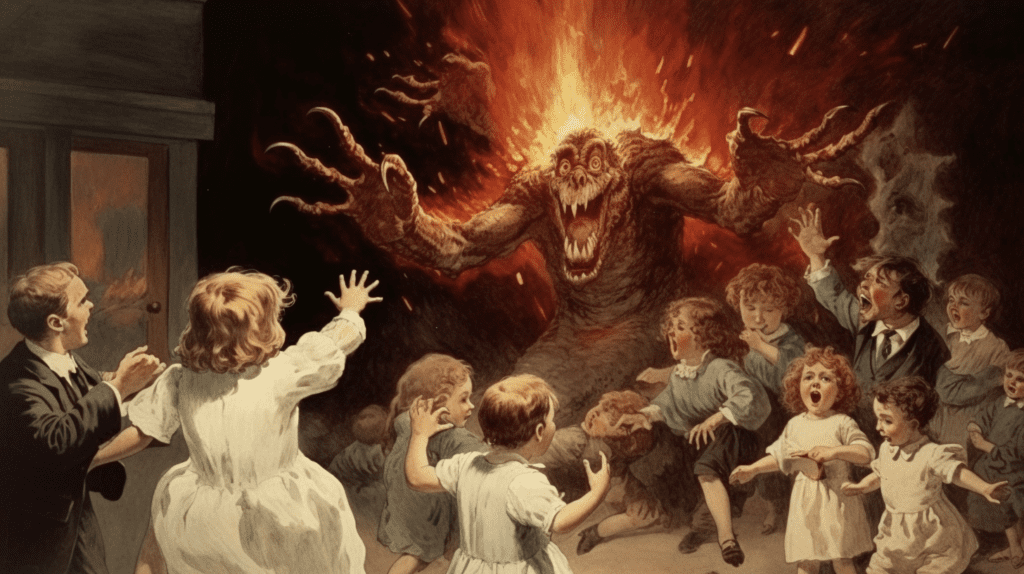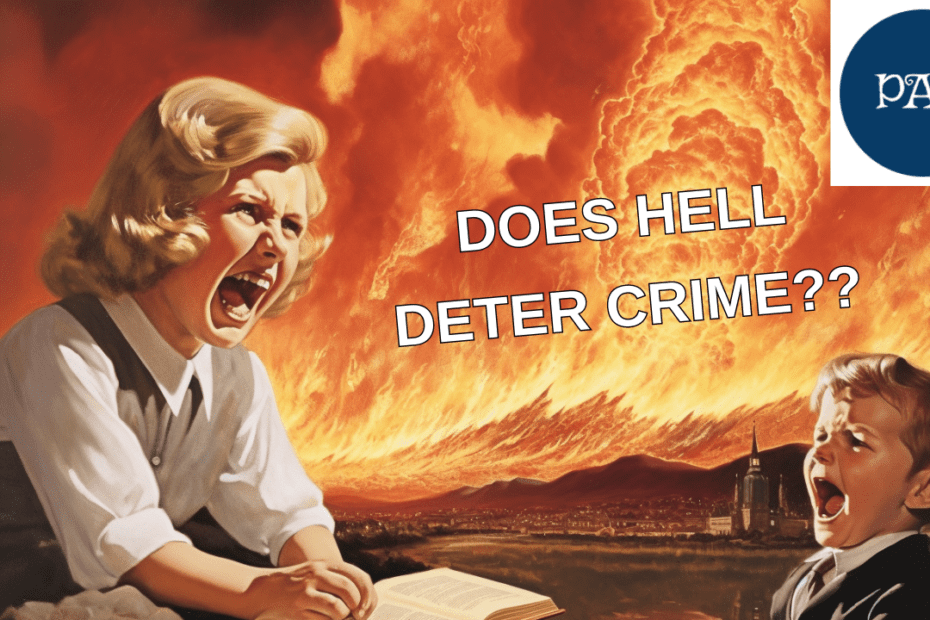Video: Religious Fear: Does the concept of hell actually deter crime or just cause religious trauma?
(Directly playing the video will automatically display subtitles in your language. If the subtitles are not in your language, you can go to Youtube to use the subtitle function.
If you like my content, you can also subscribe for more.
“If you keep lying, be careful or you’ll end up in Hell where the Devil will pull your tongue out !”
“If you don’t finish your meal and waste food, in the afterlife you’ll be forced to eat the leftovers in Hell!”
“If you don’t respect your elders, you’ll be cast into Hell, where there are eternal flames and you will be forced to climb a mountain of thorns or be thrown into a cauldron of boiling oil!”
Were you ever subjected to these kinds of “supernatural threats” when you were young?
Beyond the emotional blackmails of parents, many have come across religious pamphlets in churches warning about the “End Times” or handed out by missionaries. Such widely distributed religious literature often resorts to including detailed and terrifying illustrations of Hell, using fear as a means to encourage people to repent and turn to the good.
But have you ever wondered if these “supernatural threats” truly promote societal stability and curb antisocial behaviors?
Furthermore, can this method of teaching cast a shadow over a child’s psyche?
Hi, I am Shao Chieh Lo, welcome to what people also ask, where I answered some of the most Googled questions with even more Googling.
Today’s query is “Does the concept of hell actually detter crime? ”, We will discuss some sociological and psychological research related to beliefs about Hell and explore the effects these universally observed “supernatural threats” might have on society and individual psychology, with PAA.
So let’s start with our first question:
Can the belief in Hell really deter crime?

From a sociological perspective, analyzing the direct relationship between beliefs in Hell and crime rates is quite challenging.
Firstly, defining the belief in Hell itself is a challenge. Different cultures and religious beliefs may have vastly different interpretations of the concept of Hell, making it difficult to measure on a standardized scale.
Additionally, crime rates are influenced by numerous factors, including economic conditions, education levels, law enforcement strategies, and societal norms. Even if a correlation exists between beliefs in Hell and crime rates, it may be difficult to distinguish this relationship from these other factors and establish direct causality between the two.
Moreover, religious beliefs may change over time within a society, meaning that any correlation observed at one point in time might not apply to another.
Despite these challenges, many sociologists have tried to analyze the effects of beliefs in Hell and “supernatural threats” on society.
For instance, a study published in 2011 in “The International Journal for the Psychology of Religion” pointed out that students who believed in a more benevolent deity were more likely to cheat in exams than those who believed in a more wrathful god.
Initially, they recruited 61 college students from various religious backgrounds and asked them to fill out a questionnaire about their views on God. This survey included positive descriptors like forgiving, loving, and gentle, as well as negative ones such as strict, angry, and fearful.
The researchers then subjected them to a “cheating test.”
Participants were asked to take a 20-question test. Before the test started, researchers pretended to inform them of a software glitch where if they didn’t press the spacebar immediately after seeing a question, the answer would appear. They were urged to press the spacebar promptly after viewing each question. However, this “bug” was intentionally designed by the researchers to evaluate the participants’ honesty levels, as not pressing the spacebar to see the answer would be cheating.
The results revealed that regardless of the participants’ religious beliefs, those who had a more negative view of God in the previous survey were less likely to cheat than those with a positive view. Thus, they inferred that individuals who believe in strict supernatural punishment tend to adhere more closely to societal moral norms.
Furthermore, a study published in June 2012 by psychologists Azim Shariff from the University of Oregon and Mijke Rhemtulla from the University of Amsterdam also supported the idea of a negative correlation between beliefs in Hell and crime rates.
They drew on data from the World Value Survey and European Values Surveys from 1981-2007, encompassing 26 years and 67 countries with 143,197 participants, including followers of Christianity, Islam, Hinduism, and Shintoism. In these surveys, respondents were orally questioned about their beliefs in Heaven, Hell, God, etc.
They then sourced crime rates for various offenses (like kidnapping, drug trafficking, murder, theft, etc.) from the United Nations Office on Drugs and Crime and analyzed the relationship between different belief systems and crime rates.
Analysis revealed that countries inclined to believe in Hell had lower crime rates. In contrast, belief in Heaven not only failed to lower crime rates but was associated with higher crime rates.
Interestingly, when subtracting the percentage of people in each country who believed in Hell from those who believed in Heaven and then analyzing the result, there was a clear positive correlation between the “Heaven minus Hell belief differential” and crime rates.
This means the more a country’s population leans towards belief in Hell, the lower its crime rate, and vice versa for belief in Heaven.
However, the researcher also noted that the study only establishes a possible correlation between beliefs in Hell and crime rates. Whether the belief in Hell causes a decrease in crime rates requires further research for a definitive conclusion.
Does the supernatural threat and religious fear promote genuine altruistic behavior or is it just obedience to authority?

By now, many progressive people might have already rolled their eyes.
Yes, many people might have already noticed one of the potential issues of using crime rates as a measure of antisocial behavior: crime doesn’t necessarily mean antisocial.
Although we usually consider law-breaking actions as antisocial behaviors, sometimes certain criminal actions might stem from resistance against unjust laws or systems, rather than a rebellion against society.
Furthermore, in societies where the law favors specific classes or power holders, or where privilege or authority exists, the law is more often used to protect the interests of the powerful rather than the public.
In such scenarios, a lower crime rate might merely reflect the degree of people’s obedience, not their genuine altruistic actions and psychology.
If people are simply obeying the law due to fear of punishment, then a low crime rate might not signify societal harmony and progress but only demonstrates people’s compliance.
So, the topic we must delve further into becomes: does the supernatural threat foster genuine altruistic behavior, or is it just obedience to authority?
A study published in the Journal of Research on Adolescence in 2019 employed a different method to investigate this question. In this study, researchers conducted an online survey of 760 adolescents. One part of the survey questioned their view of God and analyzed whether the participants leaned towards seeing God as ‘punitive’ or ‘benevolent’.
Another part surveyed their daily behavior, analyzing how many ‘aggressive actions’ they engaged in daily (including physical attacks, such as intentionally pushing someone, or verbal attacks like cursing, insulting, threatening, spreading rumors, or excluding someone from a group, etc.)
The results found that those who believed in a benevolent God were associated with fewer aggressive behaviors, while those who believed in a punitive God were associated with more aggressive actions. This blurs the connection between supernatural punishment and antisocial behavior, providing another direction for studying this topic.
Are supernatural threats and the concept of hell really good for society?

If, in addition to discussing crime rates, we broaden the scope of discussion and further explore the impact of beliefs in hell and supernatural threats on public interests and society as a whole, we can see sociologists putting forth various arguments both in support and opposition.
From an evolutionary perspective, evolutionary biologist Dominic Johnson and psychologist Jesse Bering proposed an intriguing theory in a paper published in Evolutionary Psychology in 2006. They suggest that the concept of supernatural punishment provides an evolutionary advantage for human societies.
They argue that humans possess two characteristics that distinguish them from other species. Firstly, humans instinctively use the “Theory of Mind” – the assumption that others possess a mind similar to one’s own, which helps explain their actions. Secondly, the use of human language enables us to quickly communicate complex ideas.
These two features allowed early humans to leverage social constraints to control others’ selfish behaviors, providing an evolutionary advantage over other species.
For instance, chimpanzees can act selfishly in front of other chimpanzees without being reported to those not present. However, for humans, we know people can hear, discover, infer, remember, report, hypothesize, plan, and act based on others’ behaviors. Meaning, if we commit harmful acts in front of others, we might face group sanctions.
The problem is, early humans didn’t have surveillance cameras. They couldn’t possibly monitor everyone’s actions at all times. At this juncture, the concept of an all-knowing and omnipotent deity watching over you and ready to punish wrongful deeds becomes extremely useful!
Dominic Johnson and Jesse Bering believe that over time, societies that embraced the concept of a ‘punishing deity’ would fare better and survive longer than societies that didn’t believe in supernatural punishment.
A 2003 study by Harvard University researchers Robert J. Barro and Rachel M. McCleary found that in developed countries, nations, where belief in hell outweighed belief in heaven, had a higher Gross Domestic Product (GDP), seemingly supporting the aforementioned argument.
However, not all scientists endorse this view. Evolutionary scientist Nicolas Baumard and anthropologist Pascal Boyer, in a paper published in Evolutionary Psychology in 2013, pointed out that many ancient societies, including the highly developed civilizations of Ancient Egypt, Greece, Rome, Aztec, Inca, and Maya, had organized religions. But a close examination of these civilizations’ religions reveals that their gods, apart from demanding sacrifices and loyalty, weren’t overly concerned with human morality or how humans treated each other.
Those familiar with Greek mythology know that many gods in Greek myths had dubious moral standards.
Yet, these aforementioned civilizations didn’t stagnate or fare worse than others with ‘moralized religions’ due to their lack of such beliefs.
Therefore, they challenge the theory that supernatural punishment serves as a driving force for societal development. On the contrary, they believe the causality is the other way around. Present-day religions lean towards moralization because humans have evolved moral intuitions, and religions that align with these intuitions resonate more with people, ensuring their continuity.
Does belief of hell cause psychological trauma? Should parents use the fear of hell to scare their children?

Wow~ So the belief in hell has so many benefits? Not only does it enhance societal stability but also promotes economic development.
Dear parents, please hold on a moment. Before you attempt to use the fear of hell to scare the children, making them unable to sleep at night, it might be wise to consider a few issues.
Firstly, as Azim F. Shariff mentioned, his research only demonstrates that the belief in hell correlates with crime rates and GDP. But “correlation” does not equate to “causality.”
Furthermore, even though a carefully designed “cheating experiment” seems to indirectly suggest a causality between hell and crime, this study lies within the domain of social sciences. Given the myriad of interconnected factors in a societal system, even with experimental processes, we cannot be entirely certain if the study’s theory can be applied in everyday decisions.
Moreover, even if the belief in hell does indeed foster societal stability and boost GDP, according to another study released in 2014 by Shariff and Lara Aknin, a psychologist from Simon Fraser University, the price for believing in hell might be a decline in personal happiness and life satisfaction.
This research utilized data from the Gallup World Poll of 455,104 samples from 155 countries taken between 2005 and 2009. Participants were asked questions like “How happy have you been these days?” and “Did you laugh yesterday?” to assess their life satisfaction and happiness levels.
Then, this data was analyzed in conjunction with religious values data from the World Value Survey and European Values Surveys. The analysis showed that the difference between the percentage of a country’s population believing in heaven and that believing in hell correlates positively with happiness levels. Essentially, the more a nation leans towards believing in heaven, the happier its people are; the more it leans towards believing in hell, the less happy they are.
However, this statistical analysis only proves a correlation between the belief in hell and happiness levels. It doesn’t support the hypothesis that “belief in hell leads to decreased happiness.” (For instance, it might be that those with more miserable lives tend to believe in hell, rather than believing in hell causing unhappiness.)
To further establish a causal relationship, they took a more “individual” approach, using a priming technique to study the same topic. They recruited 422 participants and randomly divided them into three groups. Each group was asked to write a short essay of 100-200 words on “heaven,” “hell,” or “what did you do yesterday?” Then, they were asked to rate their mood after writing, assessing emotions like “happiness,” “sadness,” “guilt,” “security,” “fear,” “shame,” or “calmness” on a scale from 1 (very slight or none) to 5 (very strong).
The result was that those who wrote about heaven felt no significant difference in mood compared to those who wrote about “what they did yesterday” (aka control group). However, those who wrote about hell, regardless of their religious beliefs, tended to feel unhappier than the other two groups.
Therefore, belief in hell could indeed impose a psychological burden, especially if such a concept is enforced upon young children whose minds are still developing. The impact on their mental health could be immeasurable.
Moreover, as mentioned earlier, what the belief in hell might be encouraging is merely obedience to authority, not genuinely altruistic behavior.
So rather than demanding children to conform out of fear of hell, genuinely explaining the potential impact of their wrong actions on others, to foster empathy and responsibility might be a healthier and more effective approach.
So If you made it to the end of the video, chances are that you enjoy learning what people also ask on Google. But let’s face it, reading PAA yourself will be a pain. So here’s the deal, I will do the reading for you and upload a video compiling some fun PAAs once a week, all you have to do is to hit the subscribe button and the bell icon so you won’t miss any PAA report that I compile. So just do it right now. Bye!
References:
